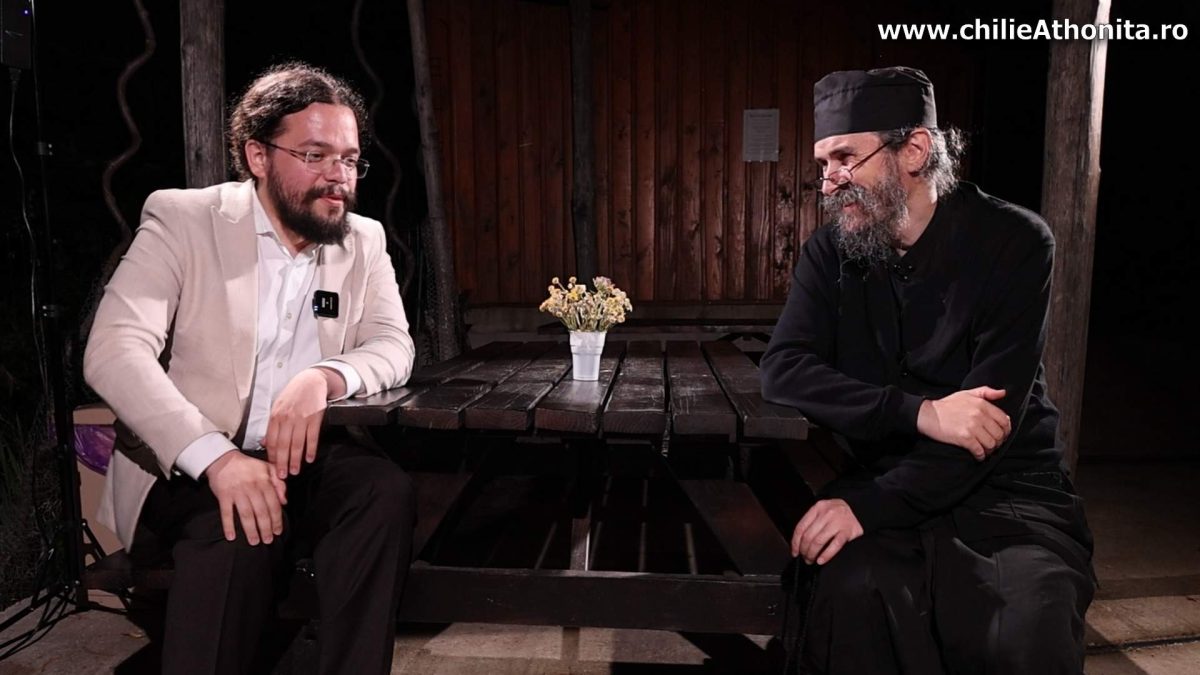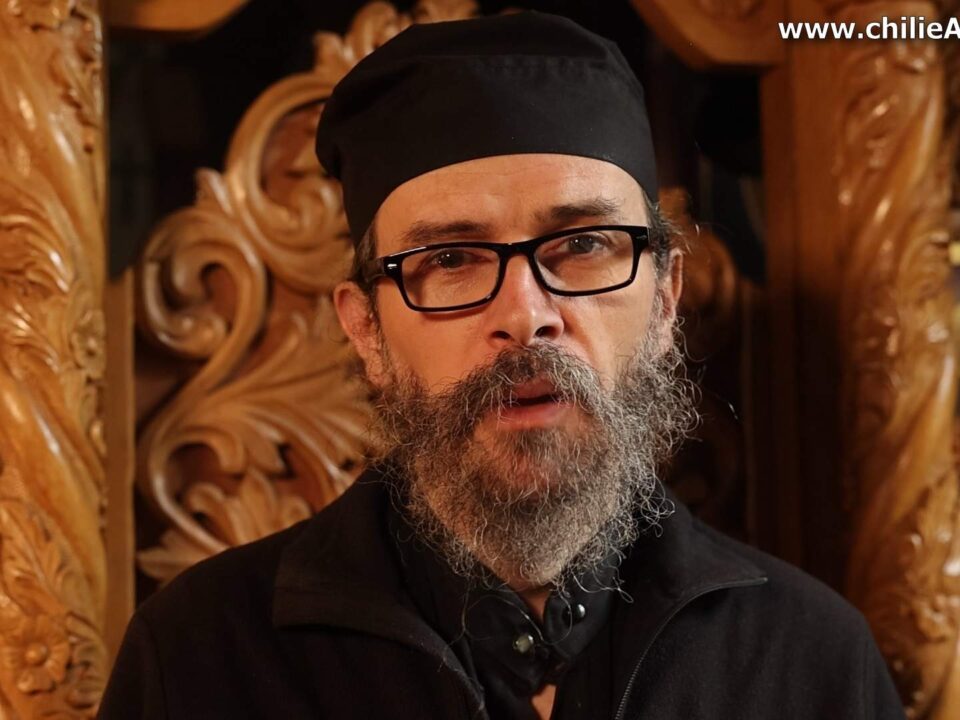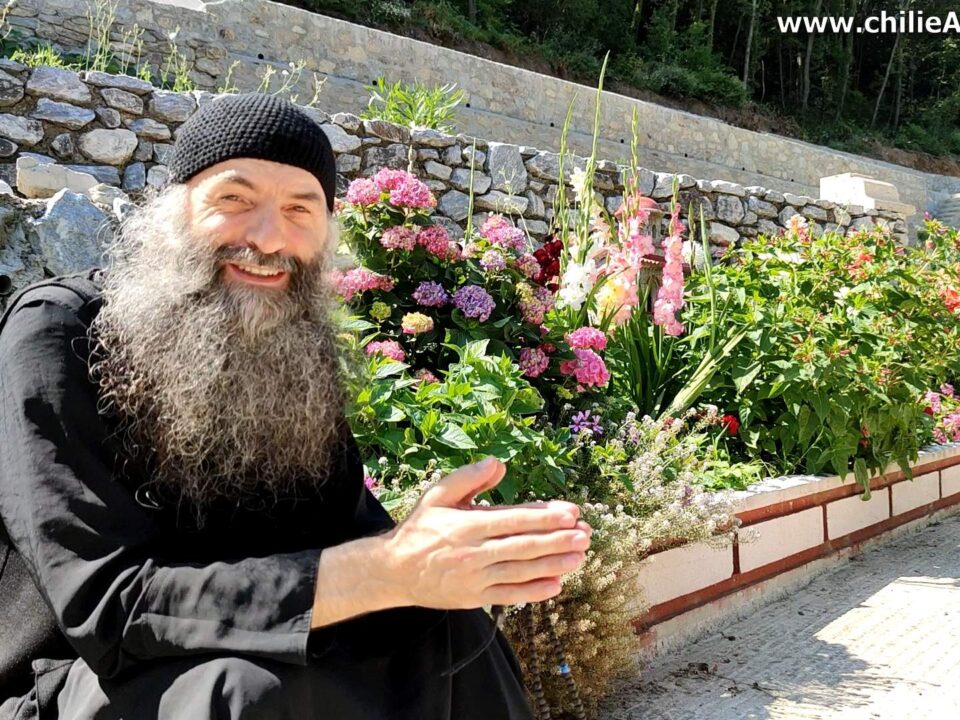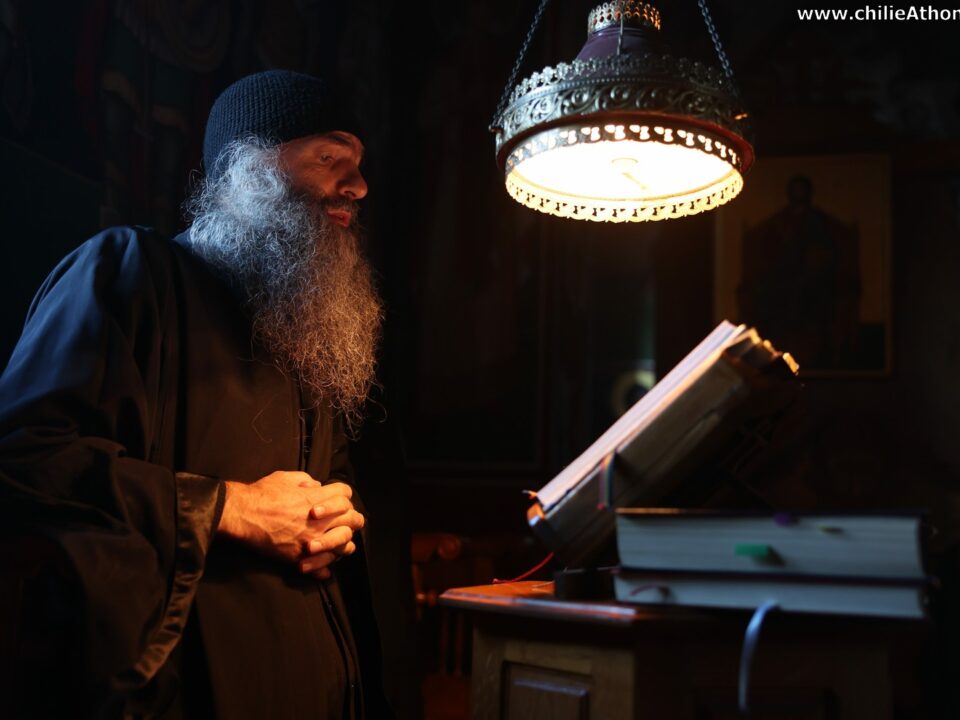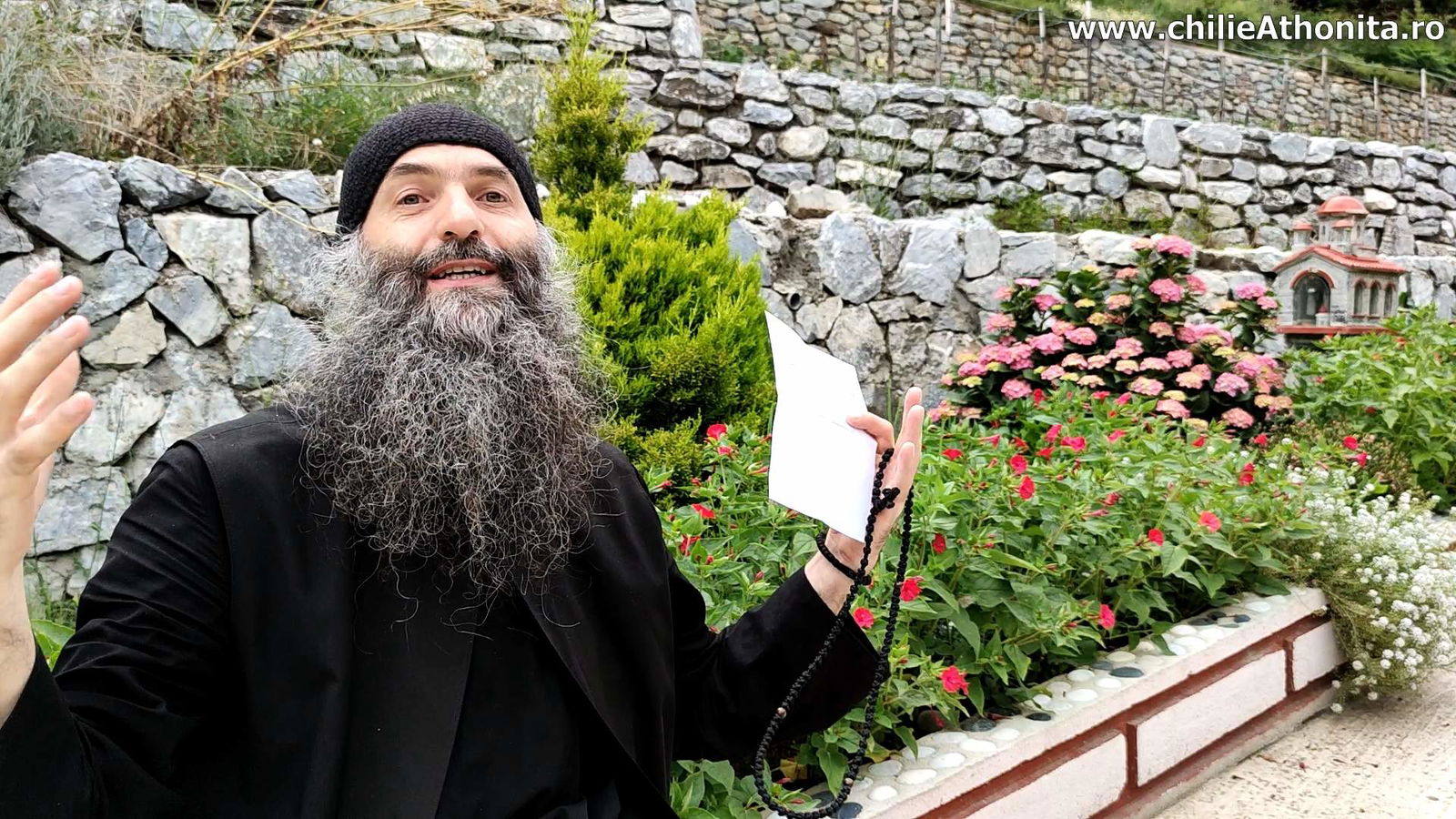
Questions and Answers: What Is the Holy Mountain, How Are the Feast Days Experienced – Father Pimen Vlad
7 July 2022
Good and Bad Estrangement – Father Theologos
12 July 2022A team from Trinitas TV came to the Holy Mountain and on this occasion we conducted an interview with producer Răzvan Clipici in which, with a lot of peace and delicacy, Răzvan reveals to us a little of the unseen work and the state of the heart of a Trinitas TV producer.
Enjoy!
Glory to the Father, and to the Son, and to the Holy Spirit, and now and ever and unto the ages and ages. Amen
Through the prayers of our holy fathers, Lord Jesus Christ, Son of God, have mercy on us! Amen
About the mission of the Orthodox Church through the media
Father Teologos: Today, on the Sunday of the Romanian Saints — in Romania celebrated — and on the Athonite Saints Sunday that is celebrated today in the Holy Mountain, we have a team from TRINITAS headed, to say so, with Răzvan Clipici who is editor and presenter at TRINITAS.
We are going to talk to Răzvan about a big problem today: the problem of mission in the 21st century. I ask Răzvan to tell us a little from his experience at TRINITAS and not only about how he sees the mission work of the Orthodox Church mainly, of course, of the Romanian Orthodox Church, from his experience, in contemporaneity. You have the word…
Razvan Clipici: Thank you very much for inviting me to participate in this podcast in the first place and I will try as much as possible to present some information that may help those who watch us.
What I can tell you is that the Romanian Orthodox Church (ROC), starting with 2007, at the initiative and with the blessing of His Beatitude Patriarch Daniel founded the BASILICA press trust, which includes several segments: Basilica News Agency, TRINITAS Radio, TRINITAS Television and LUMINA newspaper.
I am more involved, of course, as you have presented, in the television work. I take care of documentary films and I believe that the message that the Church wants to convey reaches perhaps the most easily the believers, through image. We live in an age of image, we live in an age where man no longer has so much patience to research, study, read a lot, unfortunately, although this activity is extremely useful and then I believe that the message of the Church can be more easily received through video materials.
From the experience of past years, I know that documentary films play a very important role in terms of preferences of those who watch posts, for example, from the YouTube channel of TRINITAS Television. Most visualizations are those made based on documentary films, especially films that refer to the lives of saints or the lives of great pious, great priests.
Saints and priests in… images.
Eternity of holiness
Father Teologos: How do you explain — why is there this preference of people regarding the image? Not only to the image, of course, but I am interested first of all, this preference of people for the saints, for the great priests.
Razvan Clipici: I think people need landmarks, they need people to show them that holiness is not something that happened 2000 years ago, but holiness is as current as in the Savior’s period and nowadays. We have heroes of faith, that basically this is the saints, who prove to us that this body that each of us carries can deify itself. Christ can find in us something of the love he has shown for men.
Father Teologos: That is, Orthodoxy is valid today and will be forever and ever, for Christ the same is now and today and tomorrow and forever, amen.
Razvan Clipici: And I think one more thing: that this shows us that the grace of the Holy Spirit works in history, and the Church still has its purpose just as it had in the first centuries. Basically, if the Church no longer has saints, then there is no point in it.
Father Teologos: Exactly!
Razvan Clipici: The church must give birth to saints.
Father Teologos: The church is the workshop of saints, the Church is the factory of saints, that is its purpose.
Razvan Clipici: Yeah, yeah… Laboratory of salvation, as Father Stăniloae says.
Initiatives
Father Teologos: Exactly. And that’s why I think these reports are very important, and in fact, I think these landmarks keep people alive. And because of this, I think God validates this mission work very much, and we really enjoy and welcome this initiative of the Patriarch and the Patriarchate in general, to establish the TRINITAS channel and above all, to canonize the saints, to officiate the cult of the saints now, because people need these things.
Razvan Clipici: I would like to say that the Church not only, of course, is this the role of any autocephalous church to canonize the people who rose from the bosom of that church, who sanctified their lives and whose holiness was ascertained by both believers and hierarchs of that church council, but I believe that in our Church there is another very beautiful activity, also thought by Father Patriarch, namely that of consecrate each year to a great spiritual personality or a very important spiritual theme.
Father Teologos: Oh yeah!
Razvan Clipici: And this year is the year of prayer and the year of the Holy Isyhasm: Simeon the New Theologian, Gregory Palama and Paisie Velicicovschi.
Father Teologos: Glory to the Lord!
Razvan Clipici: In this context, we also came here, in the Holy Mountain, to film several interviews with parents who met both Father Dionisie Ignat from Colciu and Father Petroniu Tănase — who were parents with a chosen life, with a holy life, who struggled in these parts blessed by God and Mother of God.
Journalist activity
Father Teologos: So if we both agreed that God really wants this mission work, and it really is a much-needed mission work, have you seen concrete signs of God’s help in your work?
Razvan Clipici: Of course! I think when you work with such materials, let me say biographical films of some saints have of spiritual parents who are… of course, everyone knows their lives and many of us already honor them as saints even though sometimes the cult of that saint has not been officialized yet, but I lived such moments when, of course, I was in a deadlock, I couldn’t find ways to reach certain people, to schedule certain interviews, all kinds of temptations were happening, the car won’t work, the boat no longer took us or…, whatever, were a lot of situations.
And of course, then in these situations, I turned to the help of the saints and felt it concretely. You only have to ask for it, that God always comes out to meet you, and of course God works through His saints. And these saints intercede.
Help of Saint Nektarios
Father Teologos: Could you give a concrete example or a saint who specializes in such helpings?
Razvan Clipici: I have a saint very dear to my soul — Saint Hierarch Nektarios.
Father Teologos: Aha! Ok.
Razvan Clipici: A saint who is very popular in Romania and who is worshiped in all Orthodoxy and I believe that this honor that was given to him after his transition to eternal life was in line with his humility. As humble he was, as he is known today, Saint Nektarios and as humiliated he was.
Father Teologos: Yeah, yeah…
Razvan Clipici: Because Saint Nektarios during his lifetime was totally despised by contemporaries, even humiliated, mocked, accused of guilt that were not his own and this saint is a very quick-helper saint. I consider him protector of mine, even though I am not called Nektarios, but I count him as protector of mine and permanently pray to Saint Nektarios. Not only in situations of illness, suffering, the Saint showed mercy on me or my family, but also in concrete situations, in concrete circumstances of life.
Many times, I met people who were helping me with certain problems that I had to solve and who were late to resolve themselves.
Father Teologos: Aha. And you shout to the Saint.
Razvan Clipici: Of course, I was shouting to Saint, help me and finally, I don’t know how it was that man ended up telling me about Saint Nektarios.
Father Teologos: Glory to the Lord! How nice!
Razvan Clipici: I was even talking to a parent and told him some stories in which the Saint helped me concretely and said that Saint Nektarios cannot leave his children.
Father Teologos: Right, right. And so it turns out he’s the protector of those on television, let’s say.
Razvan Clipici: I don’t know if that of those on television. He is the protector of all those who seek his help.
Father Teologos: Yes, that’s right.
Saint Nikiforos the Leper
Razvan Clipici: And the same, now during the pandemic, I found this and I myself think that I sign up or wish to join among those who have great piety to this saint: Saint Nikiforos the leper.
Father Teologos: That’s right, yes.
Razvan Clipici: A saint who helps a lot and I would say that he is a very friendly saint.
Father Teologos: Yeah, yeah…
Razvan Clipici: All the saints were distinguished by the humility of their lives and in this case Saint Nikiforos the leper proved to be of complete humility and patience through all the sufferings he endured in his life. And now, after his sleep, especially during the pandemic, he proved to be a hasty helper towards all those who asked for his help.
Facing hostile reactions
Father Teologos: Yes. Good. That’s the positive sides. Somehow there are certain negative reactions to the fact that — why television, why… things like that? A small parenthesis forward. You should know that in the Holy Mountain, the initiative of the Romanian Patriarchate to have, however, I believe, one of the best if not the best television or radio station, this system called BASILICA — TRINITAS, in the Holy Mountain this initiative is regarded very well. But did you have, as I said, negative opinions about these things? How did you manage them?
Razvan Clipici: Now, I think that any work in anyone’s life is also challenged by some, appreciated by others. I personally did not have such confrontations. Probably at the level of television leadership there were also such problems. But I think that by the mission that television is doing, and here I am not just referring to these materials that I have referred to.
The purpose of television for the sick
I think the most important work of television is another. Namely the fact that services are transmitted every day: Divine Liturgy and Vespers every day, and for the helpless people, for those who are bedridden, for those who cannot leave the house, and during the pandemic I do not say, for those who were actually allowed to leave their home only for urgent situations, I believe that television has a sanctifying work.
It is very important and I arrived to film for other subjects, I ended up in many monasteries where I met sick monks or nuns, who were bedridden and who told me how much they use Radio TRINITAS or TRINITAS Television for being able to attend services, even if indirectly and to feed themselves spiritually from them.
It’s very hard to be immobilized, not to be able to attend services and want it. But this, nowadays, thank God, can also be solved by means of technology.
An example of an opinion review
Father Teologos: Exactly. One of the advantages of technology. Before I ask you the next question, I want to confess something too. The greatest liturgist, for who does not know, specialist in Liturgics, professor Mr. Stelianos Papadopoulos, at the moment the Greek television wanted and broadcast the Mass live, he was very against this, saying that man must be there because Mass is an eminently interpersonal act and must be face to face man with God and so on.
Of course Mr. Professor was right, but up to a certain point. And this point was until the moment when the professor, due to old age and other factors, fell ill And he was bedridden and was on a hospital bed. And at that moment he began to watch Mass on TV. And if before thundered and flashed against live broadcasts, that man must be in the church and indeed the man must be in the church. So brothers, we must not use as justification of our laziness the fact that TRINITAS broadcasts live the service. No way.
Who can walk, must necessarily go there. But the moment someone cannot go, TRINITAS is effectively savior, sanctifier And he testified about this, as I said, and the greatest liturgist, liturgist — how to pronounce it in Romanian, I don’t know how, liturgos…
Razvan Clipici: Liturgist
Father Teologos: Liturgist, so, of the world, Professor Stelianos Papadopoulos who said that television is really great at the moment when someone cannot be in corpore there, of course not for reasons of passion. That’s what I wanted to complete and…
Razvan Clipici: Yes, sometimes television can also create a convenience for some.
Father Teologos: Exactly that.
Razvan Clipici: But I did not refer to these cases.
Father Teologos: Of course, of course.
Razvan Clipici: It is very important to say that maybe people during the pandemic have become accustomed and more comfortable.
Father Teologos: Yes, yes
Razvan Clipici: Because maybe on Sundays they didn’t have to wake up so early as to prepare to be able to get to the church or monastery where they used to attend the Divine Liturgy, and of course, after giving access to churches, maybe some of them still preferred to sit in front of televisions. No.
I think that only in situations of illness, of helplessness, then we must resort to this variant and of course, also in this situation where there are such bodily powerlessness, the Holy Communion should not be ignored. That is, further the priest will come to the head of the sick person, let him confess, let him take the Communion. There must be actually and direct work.
Father Teologos: Of course, personal, inter-personal.
Razvan Clipici: Yes, yes, yes. But in the rest of the time that obviously the person can’t move, I think it’s a savior…
Improvements
Father Teologos: Yes. What could people do? In general, how could TRINITAS be better and how could the work, in general, of the Church, including us, be better?
Razvan Clipici: I think for both I have only one answer: if I want something to change either in television or in the church, or in my country or in the world I live in, the change would be to begin with me. I must want to be better, I must want to take greater care of my neighbor, I have to change so that seeing my change and others change.
Father Teologos: That is, you to be the change you should see in others.
Razvan Clipici: Yes. As Saint Seraphim of Sarov says — gain peace and thousands will be saved around you. I think it is also true in such changes. Maybe many times we wait for others to change. I do not think that here is the key to the answer, but any change must leave with me. I want something better to happen, then I have to start doing that thing better.
The relessful prayer in all
At the same time, I believe that one of the most important works in the life of any Christian, also regarding the changes, concerning the course of ordinary life, is prayer. Through prayer, we can enter into communion with God and God if he believes that it is useful to allow it to happen. If not, God has omnipotence and knows much better what is useful to me to happen or not.
And I even know that there is an apophthegm in the Egyptian Pateric, I think, in which someone, a monk walked on the sand in the wilderness of Egypt and saw there the traces of his footsteps and saw another couple of steps on the sand. They were God’s footsteps. And in the hardest moments, in moments of temptation, he realized that it was just a pair of footprints on the sand. And later, when the other steps appeared on the sand, he reproached God: Lord, but when I needed you more, where were you? And God answered him: I was holding you in my arms.
Father Teologos: Yeah, yeah…
Razvan Clipici: Well, that’s how it is in the life of every man.
Father Teologos: So let’s do everything we can, but let’s not force it, let’s not force it. It’s not good, it’s not good.
Professionalism
Another question: what does the professional, (to be) professional mean to you?
Razvan Clipici: For me it means passion first of all, but not passion with the sense of sin as we translate from French, but passion in the sense of devotion. I’m not doing this because I have to get a salary, but I just do it because I like what I do, because I want people to value what they receive and at the same time, I do it with all my conscience because I want the thing to be well pleasing, to be like for Christ
Father Teologos: You are doing for God.
Razvan Clipici: That’s what I think is why every man has to do his work where he works. And it would be good for everyone to do what concerns him. To not do work or pray, activities that are alien to his concerns because then obviously there is a nuisance, a disgust towards the activities he does and it will never work well.
Father Teologos: So the professional does for God and through Him for people.
Razvan Clipici: Yes. I do not consider myself a professional. In general.
Father Teologos: No. We speak. I didn’t tell you, the people here are excluded. While the amateur does for his own pleasure, for his own selfishness. Yes. That’s it.
A story about guidance
Let me tell you a story. At one point, I confessed to Father Onuphry in the Pendeli Mountains near Athens, I don’t know if you know. He has a gift of clairvoyance very strong, very powerful. And I went inside, received me standing and said, “what is your name, Father?” And I told him: “Father Theologos, bless!” “What do you do, father?”. And I said: “You know, with computers.” “Oh, with computers! Did you type this, such, such, did you do that, that, that and so on?” Eh, he actually told me what I did. Good.
“What do you do, father?” I say: “You know, I’m doing photography and so on, but I don’t know if I can still photograph at the services…”
“Oh my, father! Necessarily and necessarily to photograph! Necessarily and necessarily do, but do in the moment when someone is in a state of tears, in a state of prayer because that is where the Holy Spirit is in the work and the Holy Spirit wants to enter into your photograph and then your photograph will be eternal.”
This is what a parent told me with the gift of clairvoyance near Athens. An old parent. I expected to…, I know? To beat me with the barcode, to beat me with the crucifix over my head.
Services in the church and photography
Razvan Clipici: Concerning what you said and I ask for forgiveness for interrupting you. I think this work of photographing during the services is a very useful one. And apart from the fact that we really expose what happened at the service, we possibly post it on the internet, on a website or simply remains in the personal archive.
If I am, for example, to make documentary films or write an article about a particular personality, I have learned how valuable an archival photograph, a vintage photograph is. In addition to its actual material value because the older it is, its value increases and so does its historical value depending on the characters that are captured in that image.
But this is also a job that I face quite often: that of searching archives — state archives, personal archives — different photos. Whether with events in the life of the church, or with events in certain monasteries, which concern a certain spiritual father or even saints, because we also have photographs of contemporary saints.
It is very important to find something about a particular person, especially since it happens that people who lived near our days, were almost contemporary with us, they lived in perfect simplicity and very hard to find a photo. And when you find it, you rejoice a lot and you share the joy with others when you present it: either in a video or in an article.
Icon and photo
Father Teologos: By the way why we are discussing. In the history of the Church there were seven ecumenical councils. Okay, nine, actually, but seven to say so in the official sense. Six ecumenical councils were made related to the dogma of the incarnation of God the Word, about, let’s say so, the Person of the Holy Trinity, of course, mainly the person of our Lord Jesus Christ. The seventh ecumenical council, however, was connected with images, icons.
I think that this shows the paramount importance of the image, of the icon for our salvation, and above all, that it was all related to the fact that the Savior we can photograph, that is, we can encompass Him in the icon, why? Because He was incarnated. I think this is very important. What do you have to say?
Razvan Clipici: I fully agree and believe that this decision of the Seven Ecumenical Synod or the decisions taken in the Seven Ecumenical Synod are all the more valuable as those who fought for the honor of the holy icons, many of them ended up as martyrs. That is, there was not only a theological dispute based only on arguments and counter-arguments, but it ended up to martyrdom. Thing that shows how important this dogma has been in the history of the Church or is, has not expired!
Father Teologos: It is, it is.
Razvan Clipici: This decision has not expired, and it is as valid as it was in the first centuries because we have representations of saints since the first centuries. And the first depiction in pictures of the image of the Savior Christ was on the Holy Veil.
Father Teologos: Really a miracle, yes.
Razvan Clipici: It was it who wiped the face of the Savior, the face of the Savior when walking on the road to the crucifixion. And in terms of image, I think that man needs to see the one before whom he worships. Of course we do not honor the matter, we do not honor the wood on which the icon is painted, we do not honor photography as matter…
Father Teologos: The chemical, yes.
Razvan Clipici: But we honor the one that is depicted in the photo, in the icon, in the fresco, in all these representations. And the honor we address to the saint ascends to the one depicted in the icon, as Saint Basil teaches us.
Father Teologos: Yes…
A story about working on a documentary
Razvan Clipici: And with regard to the archival materials I referred to later, I think it would be very nice to recall here a story that I lived with your holiness in 2019. We met at Vatoped Monastery and then I told you that I had to make a documentary film about decree 410. A film very dear to my soul, a film that I worked on for more than two years and in which I gathered testimonies of the monks who lived this very tragic experience, all over Romania.
And then I asked you if somehow you happen to have in the archive of the Vatoped Monastery, a footage taken in the 60s, when 1000 years of Athonite monasticism were celebrating. A footage made with Patriarch Justinian visiting the Vatoped Monastery and all the other monasteries of Mount Athos.
Father Teologos: That’s right.
Razvan Clipici: And you told me that there might be something in the monastery archive. And indeed, you discovered this shooting, you offered it to me, and later, I presented it within the framework of the film.
At some time, now dealing with the documentary film dedicated to Father Dionysius Ignat, discussing with the parents from the Cell of Saint Ipathy I noticed together with them — in fact, the parents even drew my attention and later this was certified — that in those filming of Patriarch Justinian’s visit to the Vatoped Monastery, Father Patriarch Justinian was greeted by two great pious Athonian those who had a chosen life, namely: Father Dionisie Ignat and Father Dometie Trihenea, the abbot of Cell Colciu — St. George. and the abbot from Cell Saint Ipathy.
Father Teologos: That’s right. Razvan Clipici: And the joy was extraordinarily great. Even though when I used these images…
Father Teologos: You didn’t know.
Razvan Clipici: Initially, I didn’t realize their presence in those shootings. Yes, and such joys still occur along the way when I work on such materials. God allows a little blessing and untold joy.
Joy of sight
Father Teologos: Yes, I think it’s all about the joy of sight and the need for sight. And Moses and Elijah rejoiced enormously when they saw God. And on Mount Sinai and Mount Tabor, then.
People need to see, and because of this I think that to sanctify us, we need icons. Today’s icons are also the Byzantine icons, the icons in the church that must necessarily exist and necessarily continue, but we also need forms of images that unfortunately today — we see that young people are very tributaries to the image and unfortunately, we still cannot give them a counter-balance to the images with which they are bombarded, but we strive.
Razvan Clipici: Yes. It is very hard now in a man’s life to manage the images he sees day by day, but I think the best pavement for self-censorship, a desire to seek to see what is pleasing to God and people, of course, is to have the permanent thought of God.
This permanent thought of God is practically a prayer. I know that I had read in the letters of Saint Theophanes the Latch. Someone asks exactly this question. The Apostle Paul says pray incessantly. And that person asked: how can we relentlessly pray that we still have other activities? It’s quite difficult
Father Teologos: Yes…
The ever-thinking of God
Razvan Clipici: And Saint Theophanes the Latch comes with the following answer: the permanent thought of God is a prayer. A prayer doesn’t necessarily have to be spoken every moment, but if you think of God then you also do what is pleasing to God, because thinking of God stops you, self-censors you to do certain acts that upset God. Although it is in man’s disposition to make mistakes after falling into sin, that is, sin has already been impregnated very deeply…
Father Teologos: Yes… it becomes a second way of life…
Razvan Clipici: Yes, but I think this thought of God can protect us from many sins and bring us closer to God. Although obviously, in everyone’s life there are moments of despondency, of falling, moments in which everyone puts somehow…
Father Teologos: The question…
Razvan Clipici: All sorts of questions that… I don’t know… everyone realizes that there is a withdrawal of grace from his life and of course then we must prove our fidelity to God. But unfortunately, many of us fail and here I give example first of all myself, but every sigh, every tear, every moment of self-recognition of the mistakes one has, means a lot before God. And the important thing is to be on track.
Father Teologos: On the way.
Razvan Clipici: We fall, we get up we go further.
Father Teologos: So, brothers, fight, pray, have good images, also look at TRINITAS because the images lead to salvation and let us not always forget to have the thought of God. Let the good God help us!
Through the prayers of our holy fathers, Lord Jesus Christ, Son of God, have mercy on us! Amen.
Online commemoration lists and donations
May the Lord help us!
Online Commemoration Lists and Donations
May the Lord help us!
If you have a bank card and wish to send commemoration lists and donations online using your card, and/or to support our philanthropic activity, including this site, please fill out the form below to make a small donation. The form is secure – we use Stripe for payment processing – a world leader in this field. We do not collect your personal data.
If you do not have a card, or do not wish to use it, visit the webpage for Online Donations and Commemoration Lists.
We will pray for your loved ones! (Please do not include inessential details like wishes, degree of kinship, introductions etc. JUST the name!)
Especially for recurring commemoration lists, we ask that you please keep them to under 20 names long. If you include a member of the family, we add “and for their families.”


